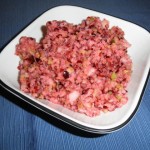by Cheryl Harris, MPH, RD and Gary Kaplan, DO
It’s a commonly misdiagnosed autoimmune condition. Its symptoms include fatigue, constipation or diarrhea, hair loss, depression, weight gain or loss, and infertility. And it greatly undermines the sufferer’s quality of life. Sound a lot like Celiac Disease? Actually, these are common symptoms of Autoimmune Thyroid Disease. Like Celiac Disease, physicians often miss the diagnosis. In fact, it is estimated that over half of the approximately 27 million people suffering with thyroid conditions have not yet been diagnosed.i
Furthermore, people with Celiac Disease are much more likely to develop Thyroid Disease than people without Celiac Disease. Similarly, people with a Thyroid Condition are more likely to develop Celiac than those without a Thyroid Condition, and this holds true even after the subject adopts a gluten-free diet.i A study by Dr. Fasano, a recognized expert on Celiac Disease, showed that half of the people diagnosed with Celiac disease also had Thyroid Disease.ii And while 1 in 133 Americans (just under 1%) have Celiac, recent thyroid review studies show that 2 to 7.8% (an average of 4.1%) have Celiac. This indicates that a person suffering with Thyroid Disease is about four times more likely to develop Celiac someone without a thyroid condition.
What is autoimmune thyroid disease?
The Thyroid is a gland in the neck that controls most of the other hormones in the body. It determines how quickly you burn calories, your heart rate, and other vital functions. The most common type of Thyroid Disease is an underactive thyroid, or hypothyroidism, which is usually caused by an autoimmune reaction where the body attacks the thyroid causing lower levels of thyroid hormones to be released into the body. This causes the body’s metabolism to slow down. Also known as “Hashimoto’s Disease,” hypothyroidism occurs most frequently in women during middle age. Another common thyroid disorder is hyperthyroidism or an overactive thyroid gland. It is caused by an autoimmune reaction (usually Graves’ Disease), where the body attacks itself, and the thyroid gland produces too much thyroid hormone.
What are the signs and symptoms of Thyroid Disease?
The signs and symptoms associated with Thyroid Disease vary depending upon whether the thyroid is under-active (hypothyroid) or over-active (hyperthyroid). Hypothyroidism typically presents with fatigue, a morning body temperature equal to or less than 97.6 degrees (compared to a normal temperature of 98.6 degrees), and dry skin and hair. Signs of hypothyroidism also may include weight gain, difficulty with mental concentration (“brain fog”), and irregular menstrual periods. People with an underactive thyroid often experience many other problems associated with weight gain including insulin resistance and diabetes, high blood pressure, and heart disease.
Signs of hyperthyroidism, on the other hand, may include high blood pressure, gastrointestinal problems, and a rapid heartbeat.
Sufferers of both types of thyroid disorders may experience sleep disorders, severe fatigue, and changes in bowel habits, ranging from constipation to diarrhea. Pregnant women, whose hormone levels change dramatically to accommodate the growing life within, may experience a variety of problems due to untreated thyroid conditions.
What might your doctor look at?
Too often medical providers get focused on one symptom or one disease process to the exclusion of other important medical evidence. In fact, the New England Journal of Medicine published a study suggesting that the number one mistake most doctors make is narrowing the differential diagnosis too quickly, which limits what we’re able to see, never mind accurately diagnose and treat. It’s critical to cast a wide net in the process of diagnosing a patient, and this takes time. Your physician will need to take the time to listen to and understand your medical history, conduct a thorough physical examination, order blood work, formulate a treatment plan for you, continually review your progress, and if necessary, retest and adjust your medications.
When thyroid disease is suspected, additional testing and treatment is required. First, a physical examination should be performed, including palpation of the thyroid gland in the neck to locate any enlargement, asymmetry, or the development of nodules. Second, blood work should be conducted to evaluate not just the patient’s TSH level (TSH is produced by the pituitary gland in the brain), but also their Free-T3 and Free-T4 levels.
Many physicians only test for TSH, and for example, when it is too high, simply direct their patients to take more T-4. The problem with this approach is that some patients with thyroid conditions lack the ability to convert T-4 to T-3. T-3 is the most active form of thyroid, which in combination with T-4, affects a person’s metabolism, heart rate, cholesterol levels, and adrenal function. Consequently, it is critical that we test for the presence of TSH and Free-T3 and Free-T4 in a patient’s bloodstream. Only with this information can we prescribe the supplemental hormones a patient needs for normal metabolic activities to occur.
If you’ve already been diagnosed with Celiac Disease and adopted a gluten-free diet, and you continue to experience any of the symptoms described above, talk with your doctor. It may be time for you to get a comprehensive physical exam and blood work. Similarly, if you’ve been diagnosed with Thyroid Disease and you’re still experiencing any of the symptoms described, consider making an appointment to talk with your doctor. You don’t “just have to live with it.”
Does a gluten-free diet help thyroid antibodies?
When someone with Celiac disease goes gluten-free, his or her autoimmune antibodies return to normal, as expected. Medical research also suggests, however, that when people with Celiac and Thyroid Disease adopt a gluten-free diet, not only do their Celiac-related antibody levels improve, but often their thyroid antibody levels also decrease dramatically. This suggests that a gluten-free diet improves thyroid function, and it may mean that people with Celiac who are gluten-free require less thyroid medication. As the authors of one study put it: “We believe that undiagnosed and untreated Celiac Disease may switch on some as-yet-unknown, immunological mechanism that sets off a cascade of other disorders.”i So, in other words, untreated autoimmune diseases such as Celiac Disease, lead to the development of more autoimmune diseases. While there is some speculation that eating a gluten-free diet may help improve thyroid function even in people without Celiac, there are no research findings proving this hypothesis.
Moral of the story:
People with Celiac Disease are at much greater risk for Thyroid Disease. So, if you have reason to suspect that you are suffering from either disorder, get tested!
—
iCanaris GJ et al. The Colorado Thyroid Disease Prevalence Study. Archives of Internal Medicine. 2000 Feb 28;160(4):526-34.
iiElfström, P. et al. Risk of Thyroid Disease in Individuals with Celiac Disease. Journal of Clinical Endocrinology and Metabolism, October 2008, 93(10):3915–3921.
iiiFasano, A. et al. Prevalence of Celiac Disease in At-Risk and Not-At-Risk Groups in the United States. Archives of Internal Medicine. 2003;163:286-292
ivBerti, I. Usefulness of Screening Program for Celiac Disease in Autoimmune Thyroiditis. Digestive Diseases and Sciences, Vol. 45, No. 2 (February 2000), pp. 403–406.






